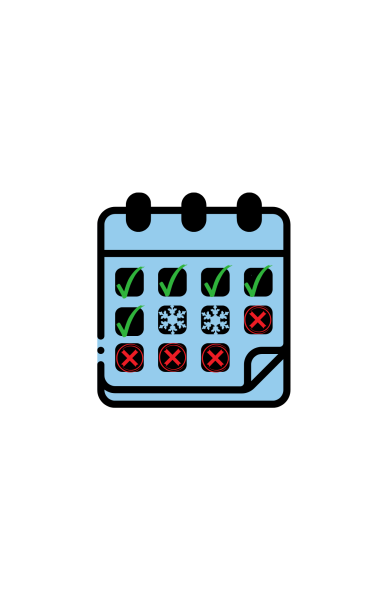The Upside to Having a Generation Grow Up On the Internet
The Internet is a grand, complex, and multifaceted network that connects millions of people from all over the world. It has allowed people from different cultural backgrounds and ethnicities to communicate, learn, and entertain the world. In a world where we are constantly divided by prejudice and stereotypes, it’s good to know that no matter where we go, the Internet will always be the same.
As of now, the Internet is free to everyone, meaning that there are no limitations or jurisdictions. Like many would say, with freedom comes responsibility, and the American people may begin to question whether or not we’re being responsible with the Internet, especially when concerning teens. This raises the question: is too much Internet healthy for the mind of an adolescent?
To be honest, as a teenager, I’ve always hated this question, because doing too much of anything will affect a person for good or bad. The fact that teenagers are still developing that makes it even worse for them to do anything without moderation. It seems that we are all aware of this fact, senior Kyle Pulsiver said, “doing too much of anything will give you a distorted image of reality…reading too many books can distort your reality…if you read fairy tales all day then you’ll start to believe life is like a fairytale…”
With the rate of technology changing, we can’t deny that teens need to be familiar with technology in order to succeed. Here, I raise my question: how can the Internet be harmful if it has become an essential part of life?
Most schools in the United States have made it necessary for students to have access to the Internet to be successful in the classroom. Panther Creek is no different; every class is required to have a Blackboard page, and many teachers often advise their students to use certain websites when they don’t understand the material. In addition, one has to have Internet access to see their grades and keep watch of their classroom progress. When the student does not have access to the Internet, then it becomes harder for them to be successful in school. This goes to show that the Internet has weaved it’s way into our everyday lives, and that its “harmful” effects on teens can’t be harmful when they’re being encouraged to use the Internet for school.
The Internet has become our main outsource of receiving and retaining information- for both teens and adults alike. Whether it has to do with news or entertainment, the Internet has proven itself to be the quickest, most accessible way of transmitting information. The obvious fault in this achievement is its ultimate defect on adolescents: “they’re too quick to stop thinking, or search for answers when they can get an easy, faster answer from Google.” Ms. Wooten explained, “They stop thinking critically.”
What most don’t see, is that teenagers haven’t stopped thinking, they’re merely thinking in a new way. Instead of reading from the textbook to get one simple answer, they want to explore the depths of the Internet to find different, creative answers from people who are experts in their fields. Isn’t this what teachers want? For students to see things on a grand scale and then to be able to determine what is relevant and what isn’t? If anything, the Internet has helped enhance our research and analytical skills, by forcing us to spend time searching for the exact answer we’re looking for. How can this in any way be harmful for teens? When most are often confused by what they learn in the classroom, they are now able to find quick and easy ways to understand things.
There’s a reason why searching for answers has become so easy, and it’s because of the real, knowledgeable people out there who want to share their comprehension with others. Websites such as YouTube have made it possible for people to widen their curiosity and take their learning outside of the classroom and into the infinite Internet. There are also videos that are meant to help students who are already struggling in the classroom, and need to hear things be explained by someone who is not their teacher.
For example, if one were to Google, “how do you solve a quadratic equation?” about 1,660,000 different links, and almost 668,000 videos will come up, containing all the different ways to solve a quadratic equation. The reason why this is possible is because there are people who want to share what they know with the world, and what better way is there to do that than with the Internet.
Another misconception is that the Internet distorts teens image of the real world, because we often spend a lot of time surfing the web, and encounter many exaggerated images or videos of real world experiences. Ms. Lozinsky says that the Internet has a tendency to portray things wrongly, especially when one is trying to achieve goals, “You’d see all these lavish homes, and all of these luxurious materialistic things on the Internet,” says Ms. Lozinsky, “but what they don’t see is the whole journey and how one person earned these things.” Although the Internet can erase hard work, or leave out important information that could change one’s outlook on an issue, distorting reality is a bit of a stretch.
There are things on the Internet that are exaggerated, or misleading, and when things like that are being viewed by a younger audience, who have yet to experience the real world, those things could distort their perspective of society. Then again, doing too much of anything can have an impact of your thinking. Speaking from a teenagers’ perspective, reality is a scary thing that we want to steer clear of; whenever we get a glimpse of it, all we see is judgement, ignorance, and hatred. This is a complicated time in our life, where we feel that we have to uphold the image that society has integrated into our brains, telling us to be perfect and nothing less. In a lot of ways, the Internet serves as an escape from all of that; on the Internet, no one can tell us what to do or who to be. During this time in our life where we don’t know how to do either, we’re given the freedom to figure it out.
The Internet has made a significant impact on our world, and its effects on teens, have been positive in terms of expression and serving as an escape from the pressures of society. Although it has made a lot of things easier to access, which can cause us to lose critical thinking skills, it has also helped the up and coming generation to acquire new skills that will allow them to excel further than any other generation.
The Internet holds a new beginning for this generation filled with endless opportunities. It starts with providing a new way of thinking, learning communities, and a gateway from reality. What it’ll end with, is a question that remains unanswered. We don’t know what the future holds in store for us, just like we don’t know if the Internet’s influence will impact teens in the long-run. So maybe we shouldn’t be too quick to judge, and instead take time to understand the modern teenager and their strange ways. Once that is done, maybe adults will understand that we need the Internet to stay sane in this nonsensical world. Besides, the Internet doesn’t seem like it’s going anywhere anytime soon, so we should do our best to live with it.









